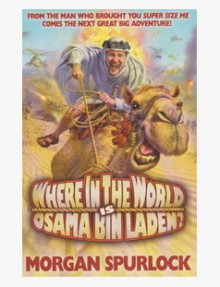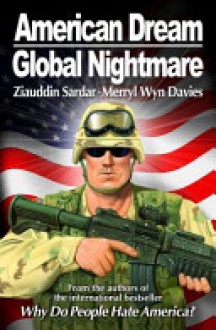
The first this that I noticed when looking a some of the reviews of this book was that Morgan Spurlock is considere a 'poor man's Michael Moore'. I am going to have to disagree with that statement. Michael Moore has become little more than an entertainer, and while Spurlock is much the same, I afind Spurlock to be somewhat more intelligent and enlightened than Michael Moore ever was. Okay, that is an opinion and it appears that there is more of a focus on Moore than there is on Spurlock, but it is clear that Spurlock tends to approach his subjects in a different, and less confrontational way. I will deal with his documentary on fast food in his other book 'Don't Eat this Book', but I believe the difference between Moore and Spurlock also comes out in this book as well.
Michael Moore tends to be very confrontational, and in a way, comes to a conclusion with little to no research, and then gets into people's faces and demands an answer. No wonder people generally can't stand the guy. However, Spurlock seems to actually go out and research his topics, and in a way, his books and his films seem to be more about his research into a subject then simply pushing a specific viewpoint. This book is a case in point. Here, Spurlock goes out into the world to try to find out why people hate American so much, and it is more an attempt to get beside them to talk to them rather than getting in their face, as Michael Moore does. If Moore were to approach the same people that Spurlock approaches in this book I am sure that Moore would have landed up in an awful lot of trouble.
The question has been raised as to whether this book is now obsolete now that Osama bin Laden is dead, but I would probably say that it is not. The question that this book tries to answer is not so much where is Osama bin Laden, but rather who he is and what he represents. As for his death, I must suggest that I am still a little dubious about it, namely because I still suspect that he has been dead for a lot longer than we actually believe he has been, and further, all we really know is that a mansion in Pakistan was raided, somebody was killed, no photos or videos were taken, and a corpse was dumped in the Indian Ocean. In a way, it is not so much the death of a man, but rather the death of a icon, and even then while the icon may be dead, the idea is not.
Spurlock travels to some of the most dangerous places in the world in his quest, and one of the things he must do is to go to a training school where journalists learn how to survive in a war zone. When I read this I was quite intrigued because at the time I knew a number of people joining the missionary movement and I discovered that none of these missionary schools taught them survival skills. I must say I am quite critical on that, but this is not the time or the place to discuss this, namely because I would rather try to explore the ideas that are coming out of this book.
Now, I read the book before I even knew of the existence of the documentary, however like most books that are written along with a documentary, this book does tend to go into a lot more detail. Granted, documentaries tend to be more visual and you can watch them in about 2 hours where as books tend to take longer to read, but in a way I do find myself gravitating towards books much more than I do towards documentaries, however documentaries are still good because you are able to watch them with friends and then discuss the implications afterwards: of course as long as ypur friends are willing to think and to discuss as opposed to simply forcing their views down your throat.
Now this book has turned out to be more of an exploration of the Muslim world from the eyes of an American who wants to understand what is going on in this world. However, he does not simply stick with Muslin countries, but he also travels to western countries where Muslims have settled into communities. This is no more obvious than in Paris where there are parts of the city that are pretty much Muslim neighbourhoods. It is interesting though that these neighbourhoods tend to be on the city fringes and very poor. It is not actually something we generally see here in Australia, because my understanding of the Muslim culture in Australia is that they are not necessarily poor. I would hardly say that they are integrated, they are not, but they have established themselves. For instance, here in Adelaide there was a Palistinian named Shahin, who came out here without a cent to his name, and ended up building a convenience store empire.
Now, I must admit that integration is something that is not easy within our countries, and one of the reasons is that our thought processes and our cultures are vastly different, and I will not speak of the Christian/Muslim divide, even though that divide is ripe for conflict. However, that divide really only exists within the fundamentalist elements, and I must say that amongst a lot of evangelical and fundamentalist Christian communities, there does seem to be little tolerance towards Muslims, but it is not so much directly only at Muslims, but rather at anybody who does not hold the same beliefs as them.
I can't say I know many Muslims myself, but I do know some, and one in particular I do have a good relationship. In fact we have spent a lot of time talking about Islam and Christianity. However, we must remember that our culture is a very liberal culture, and this is something that is not the case in many conservative Muslim countries. This is something that Spurlock had to learn and to respond to appropriately, and from what I understood, he did this quite well. He is not a Muslim, and he did not become a Muslim after his adventure, but he did come out with a much better understanding of the Muslim culture. However, our culture is different, for instance we have a tolerance for pornography, and we do not dress conservatively. We also indulge in alcohol, and this is something that is forbidden to Muslims. However, we need to remember that this is our culture, and people coming into our culture must learn to accept this part of our culture, just as we need to respect another person's culture when we travel there.
Okay, Christians tend not to be tolerant of our culture, and I must suggest that I am a bit critical of that. While I do not suggest that Christians throw away their biblically based morality, I do recommend that they do show a little more tolerance towards those who do not hold the same views as them. This can be difficult however, because in many cases it means that we cannot associate with others in certain contexts (such as going to a strip club). However, I would also not suggest that they lock themselves away in their own little communities, only going out occasionally to fish for prospective participants. I have noticed a lot of hesitation to do such things, and even then, the only time they do so is on 'official business'. I hear all of this talk about evangelism, however I hear no talk about actually making friends beyond that. To be honest, to be a friend with somebody simply to tell them about Christianity, and to discard that friendship when it becomes clear that this person does not want to become a Christian, is first of all not friendly and, I would also suggest, not Christian either.
Now, the conclusion of this book is that Bin Laden is not so much a person but an idea. It is an idea that Muslims should be proud of their heritage and of who they are, and not let another culture move in and destroy that. In the same way he is like Martin Luther King, who became not so much a person, but an idea that all people are equal and should be treated as such. In the same way Christ, while a person, is also an idea (I will be slammed for that statement), and is not so much an idea that people should be nice to each other, but an idea that through his death and resurrection, we have been forgiven of our sins and transgressions, and can come back to God to be in relationship with him.


 Log in with Facebook
Log in with Facebook 










